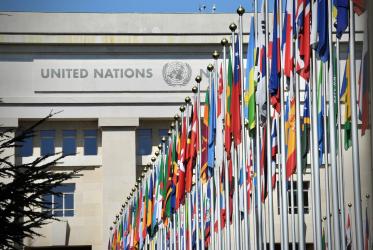Cf. WCC Upcoming events, January 2004
Cf. WCC Press Feature, Feat-04-01, of 16 January 2004
Cf. WCC Press Feature, Feat-04-02, of 19 January 2004
Religious bodies should engage more actively in empowering society to fight the negative effects of globalization on children. This view was expressed by progressive religious thinkers at a seminar organized by the World Council of Churches (WCC), the National Council of Churches in India, and the Christian Conference of Asia at the World Social Forum which ended today in Mumbai, India.
At the well-attended 19 January seminar on "Building an alternative world: affirming the dignity of children", speakers from various faiths discussed how religious bodies might get involved in protecting the rights of children.
WCC Asia secretary Mathews George Chunakara, who moderated the seminar, said that globalization and economic market reforms in developing countries are instrumental in increasing the number of children forced onto the streets and into work at an early age as additional breadwinners for their families.
The number of street children grows day by day as globalization intensifies in Asia, Africa, Latin America and Southern Europe, he said. According to Chunakara, these children are the mute testimony of economic recession, unemployment, poverty, break-down of traditional patterns of social and economic life, family disruption and lack of willingness of governments to protect the well-being of their peoples.
The speakers, from different religious traditions - Christian, Hindu, Buddhist, Muslim and Sikh - challenged the role of religious bodies in relation to the plight of children, and economic globalization in general.
Eunice Santana de Velez, a Puerto Rico-based member of the new WCC Commission on Diakonia and Development, said that the Bible demands special attention and care for children. For Santana, the cardinal principles of Christianity affirm that children should be treated with dignity. This will not come about by treating children like adults, she argued; around the world, many children are victims of brutal violence, discrimination and human rights violations. Rather, "adults need to become like children," she suggested.
Presenting a Muslim perspective, Farid Esack, director of the Cape Town-based Centre for Progress in Islam, said that both women and children exist on the edge of society. "Our attitude towards women and children may be one of kindness," but it does not accord them "dignity, justice and rights" he suggested.
In the new globalized world, Esack said, the economic system impacts strongly on children's lives. Like other social actors, religious bodies too need to ask themselves about how they use their power and resources for the good, or not, of children.
An Indian social worker and human rights activist, Swami Agnivesh spoke about radical changes needed in the religious perspective towards children. Known for his work in human rights and on child labour, Agnivesh highlighted the lack of access to basic education of India's poor children.
"According to government statistics, India has between 80 and 100 million children who do not go to school. The majority of these children are lower castes, Dalits, and Tribals from the weakest sectors of society. They are considered expendable," he said. According to Agnivesh, religious institutions should care more for the plight of children; they should fulfil their mandate to serve the poor and needy, he said.
WCC programme executive for Latin America and the Caribbean Marta Palma observed that since all the major world religions emphasize children's dignity, more inter-religious efforts and networking are needed to effectively protect the rights and dignity of children.
This view was shared by other participants at the seminar. For Rahul Vyas, a Hindu delegate of a Gujarat-based non-governmental organization (NGO), Child Health Integration Through Livelihood and Development, religious bodies could do much to improve the conditions of children world over. Religious leaders and institutions should mobilize society and even governments to address the issues of children, he said.
Representing the Bangalore-based NGO Navajeevan Mahila Pragathi Kendra, Sister Cecily said that progressive religious bodies must combat fundamentalist forces existing within their societies.
On this topic, Sanawar Khan, an activist working with children in Pakistan, reported that fundamentalist forces have gained considerable popular support in Pakistan, to the detriment of constructive work in the society, and making life difficult for NGOs. To his mind, religious institutions should join the global debate on the role of religion in society; other panelists agreed that progressive religious institutions ought to stay in constant discourse with each other to make the world a better place for humanity.
Speaking at another, earlier, major WSF debate on the impact of globalization on children, WCC programme executive for economic justice Rogate Mshana stressed the need to eradicate inequality so as to ensure access to education for all the world's children. Economic globalization driven by the neo-liberal market paradigm works against childrens' rights, he emphasized. "20% of the world's population are using 80% of the global resources. This is a glaring example of inequality. Because it deprives them of sufficient income, it prevents countless families from fulfilling their children's rights," he observed.
"It is the duty of the state to educate, but now, with the advent of globalization, education is being privatized and is becoming unaffordable to a majority of the poor," Rogate told a gathering of more than 2500, mostly children from various parts of the globe.
Other speakers at this debate, on "Children's rights in a globalizing world: holding states and international financial institutions accountable" included ten children, and human rights activists. The debate was organized by the Working Group on Child Rights in a Globalizing World, together with the Global Movement for Children.
Free high resolution photos from Mumbai are available at:
www.wcc-coe.org/wcc/what/jpc/mumbai04pix.html
Information on the activities of the WCC at the WSF are available on our website:
www.wcc-coe.org/wcc/what/jpc/wsf-2004-e.html (in English)
www.wcc-coe.org/wcc/what/jpc/wsf-2004-f.html (en français)
www.wcc-coe.org/wcc/what/jpc/wsf-2004-g.html (auf Deutsch)
www.wcc-coe.org/wcc/what/jpc/wsf-2004-s.html (en español)
For further information, please contact:
In Mumbai: Binu Alex +91 982 401 3856
In Geneva: Juan Michel +41 22 791 6153, mobile +41 79 507 6363, [email protected]






